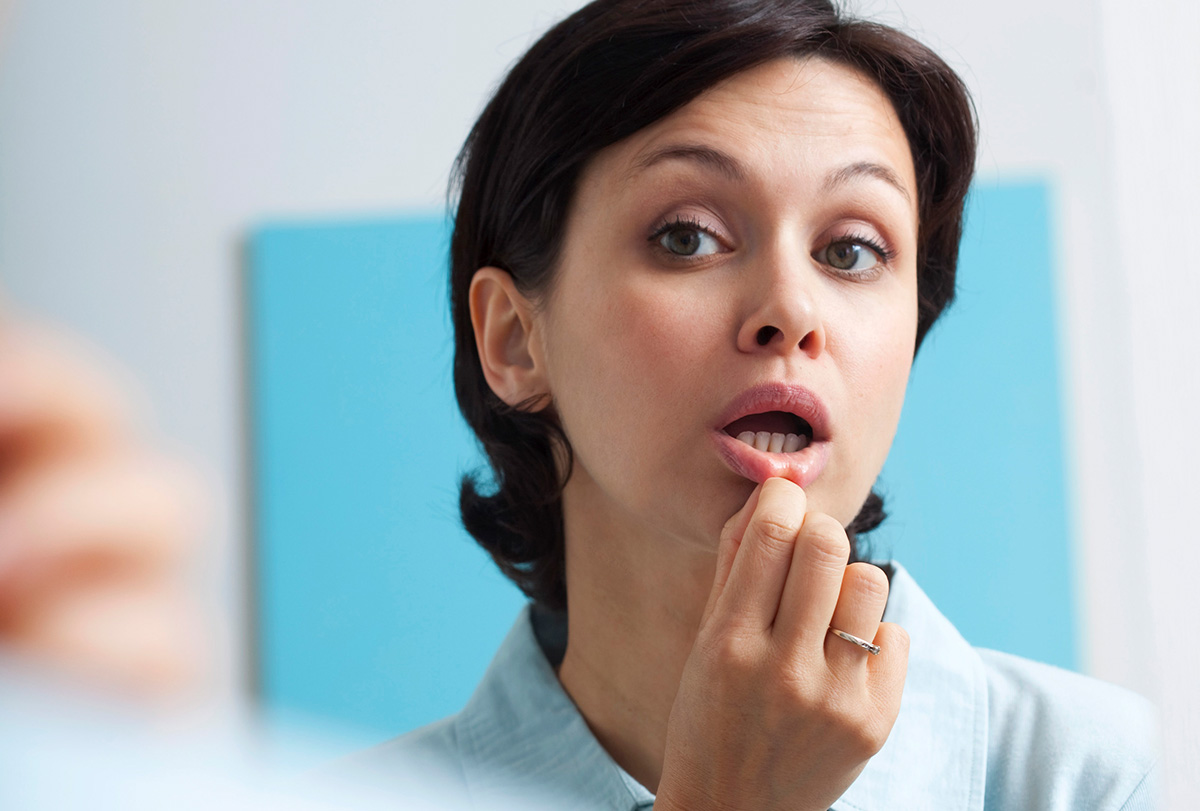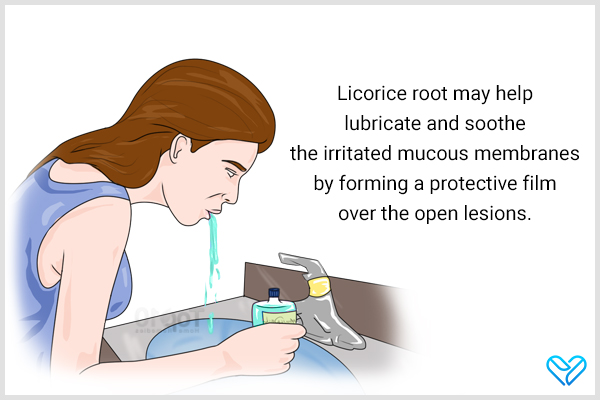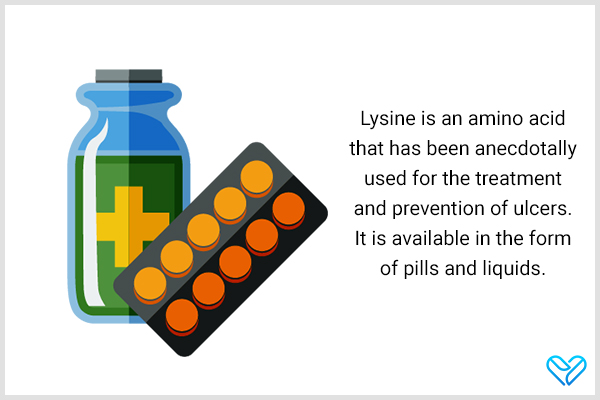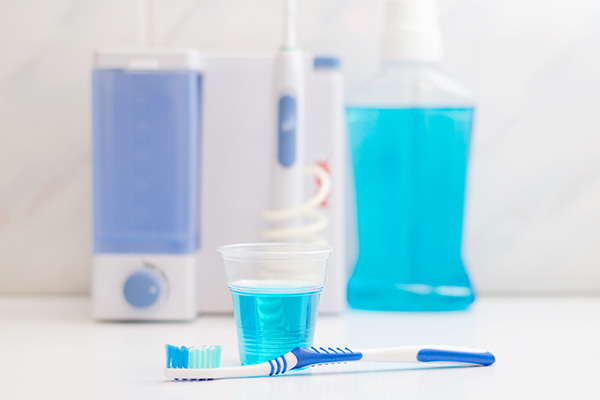In this article:
Mouth ulcers refer to open sores that develop in the oral cavity – on the cheeks, floor of the mouth, gums, and lips or under the tongue. These inflamed lesions are generally harmless but can be a source of great discomfort.

At-Home Treatment for Mouth Ulcers
Here are some home remedies to get rid of mouth ulcers
1. Dab a bit of honey
Honey is a natural humectant, which means that this viscous substance locks in moisture and prevents it from escaping.
Honey can help keep the mouth hydrated and speed the healing process by adhering to the oral lining. What makes it even more effective is that it also exhibits significant antioxidant and antimicrobial activities without any adverse side effects. (1)(2)
How to use:
Dip a clean cotton bud in honey and gently apply it to the affected area.
Scientific evidence suggests that topical application of honey can help heal mouth ulcers fast and may even reduce the risk of recurrence.
2. Rinse with a licorice root mouthwash

Licorice root may help lubricate and soothe the irritated mucous membranes by forming a protective film over the open lesions. Incorporating this healing agent in your regular oral care may help reduce the inflammation and pain associated with mouth ulcers.
Licorice root is also helpful in reducing the size of the mouth ulcer and promoting the overall healing process. (3)(4)
How to use:
- Take a deglycyrrhizinated licorice (DGL) extract in the form of chewable tablets.
- Gargle with a DGL-containing mouthwash.
Because research on the use of licorice root for treating recurrent aphthous ulcers yielded mixed results, further studies are needed to establish its efficacy.
3. Use a cold compress
Cold therapy may ease ulcer-induced pain. The application of cold temperature helps desensitize the affected site and numb the burning pain for a temporary period.
How to use:
Wrap an ice cube with a paper towel to make a cold compress. Hold this ice wrap over the lesion, but try not to exert too much pressure.
Note: Never apply ice directly to the skin as it can only worsen the damage.
4. Consume vitamins C and B
A study revealed that a deficiency of vitamin B12 and folic acid can lead to mouth ulcers. (5) Therefore, consuming a diet rich in vitamin B and C can help prevent and treat mouth ulcers.
How to use:
- Eat fresh fruits and vegetables.
- Take multivitamin supplements upon consulting your doctor. (6)
5. Increase zinc intake

Zinc and iron deficiencies can result in ulcers. (7)(8)(9)
How to use:
- Increase your intake of zinc-containing foods such as lentils, chicken, tofu, oatmeal, shiitake mushrooms, and yeast.
- Use zinc mouthwashes for rinsing. (10)
- Take zinc supplements upon consulting your doctor.
6. Try a baking soda rinse
A mouth rinse containing sodium bicarbonate, commonly referred to as baking soda, may be beneficial for relieving oral ulcers caused by acidic foods or beverages.
This alkalizing agent can help neutralize the pH of your oral cavity and aid recovery, provided it is used with the required precautions. (11)
Note: The use of baking soda is based on anecdotal evidence only and, therefore, should be employed with caution.
7. Use milk of magnesia
Milk of magnesia is a popular anecdotal remedy for treating mouth ulcers. It is suggested to help treatment due to its alkaline nature. However, there are no studies supporting this claim.
How to use:
- Dab small amounts of milk of magnesia on the sore and wash after a few minutes.
- Use a mixture of milk of magnesia and Benadryl liquid allergy medicine as a mouth rinse.
8. Use lysine

Lysine is an amino acid that has been anecdotally used for the treatment and prevention of ulcers. It is available in the form of pills and liquids. However, since there is no scientific evidence to it, it is best to consult your doctor before using lysine for treatment.
9. Apply apple cider vinegar
Apple cider vinegar (ACV) is a popular anecdotal remedy for mouth ulcers. However, it should be used with caution as its acidic nature can cause a stinging sensation. Moreover, its use is not supported by any clinical research.
How to use:
Dilute ½ cup of ACV with 1 cup of water, and dip a clean cotton bud in it. Dab the solution on the affected area. Avoid overuse, as ACV can be harmful to tooth enamel.
Self-Care Tips to Help Healing
Mouth ulcers cannot always be prevented, but you can minimize your risk by following these self-care tips.

These measures can also benefit those already suffering from a mouth sore by accelerating the healing process, reducing the discomfort to a manageable degree, and decreasing the risk of recurrence.
1. Practice good oral hygiene
This includes using a high-quality toothbrush with soft bristles and toothpaste that does not contain sodium lauryl sulfate.
Also, use gentle strokes when brushing your teeth to avoid damaging the inner lining of your mouth or gums. To keep your oral cavity in the best of condition, use an alcohol-free mouthwash that preferably contains chlorhexidine gluconate.
2. Modify your diet
Cut back on foods that are excessively hard, solid, acidic, sour, spicy, sweet, or salty as they can further irritate your mouth lining. Instead, consume a soft diet.
Eat a healthy, well-balanced diet to avoid any nutritional deficiencies that are often at the root of such ulcers. Moreover, avoid chewing gum until your ulcer heals.
3. Consume cold liquids
Refrain from consuming hot beverages until the ulcer heals completely. Stick to cool liquids instead and drink them through a straw to avoid irritating the lesion.
4. Use medicated products
Apply an antiseptic gel on the oral lesion to reduce the risk of further contamination.
You can also ask your dentist or physician to prescribe a topical steroid mouthwash or ointment or an over-the-counter analgesic such as acetaminophen or paracetamol if the discomfort is particularly bad.
5. Avoid triggers
If you suffer from mouth ulcers frequently, it is important to identify possible triggers and be wary of them. You can avoid flare-ups of this condition by avoiding the culprits.
Final Word
Mouth ulcers are a common occurrence and can be quite discomforting. They present as lesions with a white or yellow center surrounded by an inflamed red border. Several home remedies can help treat and prevent ulcers.

- Was this article helpful?
- YES, THANKS!NOT REALLY


